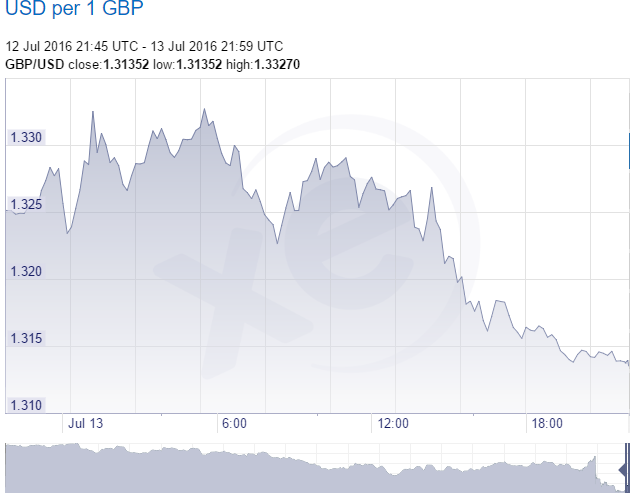After the Brexit vote on 23rd June 2016 which saw the United Kingdom leave the European Union, tough economic and political questions are now surfacing as to how the outcome will impact global markets. As an immediate effect, the sterling pound plunged by about 9 percent on the Black Friday immediately after the 52% win of the Brexit referendum. More than two weeks later the pound is trading even lower against the US dollar having depreciated by about 11% against the green buck. The situation is the same across forex markets globally; with different major world currencies appreciating against the sterling pound.
Analyzing the post-Brexit fall of the sterling pound, economist Jonathan Loynes argues that the falling pound could be a blessing to the United Kingdom. In his submission he argues that with a depreciating currency, exports from the United Kingdom will be cheaper and hence more attractive in the international markets. With this increased attractiveness, Britain’s export market will be boosted and the foreign exchange earned through the international trade will help to bridge the current budget deficit in the United Kingdom.
However, analysts from a different school of thought are of the opinion that the falling sterling pound will be detrimental to the UK economy in the long run. These are economists looking at the narrative from the import side of things; where the imports to the UK will be more expensive and hence drive up inflation. If the inflation keeps rising as the sterling pound depreciates against other major world foreign currencies, the negative impact of falling real incomes and rising cost borrowing will creep into the United Kingdom. With lower real incomes, households will have lesser disposable incomes to save and invest. On the other hand, businesses will restrain from borrowing for expansion and hence hurt production and inhibit the overall growth of the economy.
From a broader perspective, United Kingdom and specifically London is viewed as the financial center of the world. Its high integration with other financial markets across the world puts it at the focal point in the global financial and investment landscape; and hence any disturbance at the markets in London will definitely have a ripple effect across the world. After the Brexit, the stock market in the US remains resilient and it is not expected to be affected by the Brexit; at least in the short-run.
Though the indirect investments in the US may not be affected to a high extent, the direct investments from the UK to the US will suffer a blow if the Brexit situation is not resolved fast between the United Kingdom and the European Union. As of 2015, the United Kingdom accounted for about USD 483 billion of the USD 3.1 trillion in direct foreign investments in the United States. This makes UK the country with the highest FDI in the US at about 16 percent of the total figure. With most of these foreign direct investments being in form of subsidiaries of UK companies in the US, mergers between UK and US companies as well as joint ventures, any fall in the partner companies in the UK will trigger a fall for the related companies in the US. Eventually the US economy will be adversely affected and the trickle-down effect could be bigger than previously anticipated.
Within the European Union itself, the United Kingdom held a very important position by being one of the highest contributors to the European Union budget. An exit from the EU therefore means that the European Union has been left with a smaller budget to work with. Currently, the EU needs more finances to keep some of its member states afloat and prevent them from falling into economic crises. An exit by a major source of funds to the union is therefore a big blow that has the potential of unsettling the EU.
Whereas the sterling pound is depreciating against most of the world currencies and hence making its exports cheaper even to the emerging and developing economies; in the long run these economies will also suffer from the Brexit. Exports from the developing and emerging markets will tend to be more expensive for the British importers and this will be followed by a decline in imports. This will then result to low exports from these economies to the United Kingdom, while they continue to import more from the UK; hence resulting to even bigger budget deficits in those economies.
It is evident that no economy is left safe by the Brexit as the wave continues to travel further and stir confusion in other countries. However, depending on how amicable the relationship between the UK and the EU will be resolved; markets might overcome the Brexit fever and move on smoothly with a still financially strong United Kingdom.


